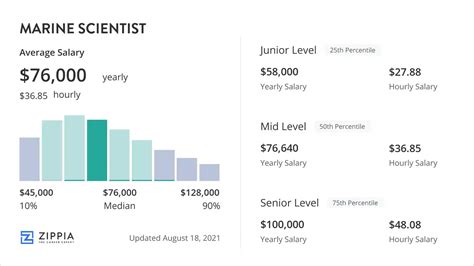A career as a marine scientist is driven by a deep passion for the ocean and a desire to understand its complex mysteries. But for those considering this path, a practical question is just as important: What is the earning potential? The answer is as vast as the ocean itself, with salaries ranging from a modest starting wage to well over six figures.
While passion is your compass, data is your map. In this comprehensive guide, we'll dive deep into the marine scientist salary, exploring the average earnings and, more importantly, the key factors that can significantly boost your income. A typical marine scientist's salary can fall anywhere between $60,000 and $95,000, with senior experts in lucrative private sectors earning upwards of $150,000.
Let's explore the financial tides of this fascinating career.
What Does a Marine Scientist Do?

Before we talk numbers, it's essential to understand the scope of the role. A marine scientist is a broad term for a professional who studies the marine environment. Their responsibilities are diverse and can include:
- Collecting Data: Conducting fieldwork at sea or in coastal areas to gather water, sediment, and biological samples.
- Laboratory Analysis: Studying marine organisms, analyzing the chemical properties of seawater, and examining geological samples.
- Modeling and Prediction: Using computer models to forecast ocean currents, predict the impact of climate change, and understand marine ecosystems.
- Policy and Conservation: Advising government agencies and non-profits on fisheries management, coastal protection, and conservation strategies.
- Publishing and Teaching: Writing research papers for scientific journals and educating the next generation of scientists at universities.
The specific duties directly influence salary, as a lab technician's role differs greatly from a principal investigator leading a multi-million dollar research cruise.
Average Marine Scientist Salary

Determining a single average salary for a "marine scientist" can be tricky, as government statistics group them into broader categories. To get the most accurate picture, we must look at a few key sources.
The U.S. Bureau of Labor Statistics (BLS) provides two relevant categories:
1. Geoscientists: This category, which includes physical oceanographers and marine geologists, reported a median annual salary of $92,020 as of May 2023. The top 10% of earners in this field made more than $205,990.
2. Zoologists and Wildlife Biologists: This category, which is a closer fit for marine biologists, reported a median annual salary of $70,720 in May 2023.
Salary aggregator websites provide a combined view. For example, Salary.com places the median salary for a Marine Biologist around $76,500, with a typical range falling between $65,500 and $88,600. Similarly, Payscale reports an average base salary of approximately $65,000 per year.
This data reveals a clear picture: while entry-level positions may start in the $50,000 to $60,000 range, a mid-career marine scientist can reasonably expect to earn between $70,000 and $95,000. Your specific salary within (and beyond) this range will be determined by the factors below.
Key Factors That Influence Salary

Your earning potential is not set in stone. It is shaped by a combination of your qualifications, choices, and professional environment. Here are the most critical factors that influence a marine scientist's salary.
### Level of Education
Education is arguably the single most important factor in determining your career ceiling and salary in marine science.
- Bachelor's Degree (B.S.): A bachelor's degree is the minimum requirement and typically qualifies you for entry-level positions like lab technician, research assistant, or environmental educator. Salaries at this level are at the lower end of the spectrum.
- Master's Degree (M.S.): A master's degree is often considered the "workhorse" degree for many professional roles. It opens doors to positions in government agencies (like NOAA), environmental consulting firms, and senior roles in non-profits. It brings a significant salary increase over a B.S. and is essential for project management responsibilities.
- Doctorate (Ph.D.): A Ph.D. is required for most high-level research positions, university professorships, and roles as a principal investigator or senior scientist leading a research division. While graduate school and postdoctoral research involve years of lower stipends, a Ph.D. unlocks the highest earning potential in the field, especially in academia and specialized private industry.
### Years of Experience
Like any profession, experience pays. Your salary will grow as you move from executing tasks to leading projects and setting strategy.
- Entry-Level (0-3 years): Professionals at this stage are building core competencies and can expect a salary in the $50,000 to $65,000 range.
- Mid-Career (5-10 years): With a proven track record, project management skills, and specialized expertise, scientists can expect to earn in the $70,000 to $95,000 range.
- Senior-Level (15+ years): Senior scientists, principal investigators, department heads, and high-level consultants command the highest salaries, often exceeding $120,000 and sometimes reaching over $180,000, particularly in the private sector.
### Geographic Location
Where you work matters. Salaries are often adjusted for the local cost of living and are influenced by the concentration of specific industries. According to BLS data for geoscientists, top-paying states include:
- Texas: High concentration of jobs in the oil and gas industry.
- Colorado: A hub for federal research agencies and consulting firms.
- California: Home to world-class research institutions (Scripps, MBARI) and a massive coastline.
States with significant federal government presence, like Maryland and Virginia (near Washington D.C., home to NOAA headquarters), also offer competitive salaries and excellent job stability.
### Company Type
The sector you work in has a profound impact on your paycheck.
- Private Industry: This sector offers the highest salary potential. Marine scientists working in oil and gas exploration, offshore renewable energy (wind farms), marine engineering, or high-tech environmental consulting can earn top-tier salaries.
- Federal Government: Agencies like the National Oceanic and Atmospheric Administration (NOAA), the Environmental Protection Agency (EPA), and the U.S. Navy offer competitive salaries, excellent benefits, and job security. Pay is structured on the General Schedule (GS) scale, providing clear career and salary progression.
- Academia: University salaries vary widely. A postdoctoral researcher may earn a modest stipend ($55,000 - $70,000), while a tenured full professor at a major research university can earn a very comfortable six-figure salary.
- Non-Profit Organizations (NGOs): Aquariums, conservation groups, and foundations typically offer lower salaries than government or private industry. However, these roles are often mission-driven and provide immense personal satisfaction.
### Area of Specialization
"Marine science" is a vast field, and what you specialize in can dictate your demand and pay.
- Marine Biology: This is the most popular specialization and, due to high supply of graduates, can be very competitive with salaries in the lower-to-mid range of the spectrum.
- Physical Oceanography & Marine Geology: These specialists are in high demand in the energy, shipping, and climate modeling sectors, often aligning with the higher-paying "Geoscientist" BLS category.
- Chemical Oceanography: Expertise in marine pollution and water chemistry is highly valued by environmental consulting firms and government regulatory agencies.
- Marine Engineering & Technology: Professionals who can design and build underwater vehicles (ROVs), sensors, and other marine technologies are highly sought after and can command some of the highest salaries in the field.
Job Outlook

According to the BLS, the employment of Geoscientists is projected to grow 4 percent from 2022 to 2032, which is about as fast as the average for all occupations. The demand will be driven by the need for responsible energy and resource management and environmental protection.
For Zoologists and Wildlife Biologists, the projected growth is 1 percent, indicating a highly competitive field.
However, emerging areas like climate change impact analysis, offshore renewable energy development, and biotechnology are expected to create new opportunities for marine scientists with cutting-edge skills.
Conclusion

A career as a marine scientist can be both intellectually stimulating and financially rewarding. While a starting salary may be modest, your long-term earning potential is significant and largely within your control.
Here are the key takeaways for aspiring marine scientists:
- Expect a Wide Range: A typical salary spans from $60,000 to over $95,000, influenced heavily by your role.
- Education is Your Foundation: A Master's degree is the key to many professional doors, while a Ph.D. unlocks the highest research and academic positions.
- Specialize Strategically: Fields like marine geology, engineering, and data modeling often have higher earning potential than more competitive biological fields.
- Sector Matters: The private industry generally pays the most, while government roles offer stability and academia provides intellectual freedom.
Your passion for the ocean is your starting point. By pairing that passion with strategic decisions about your education, specialization, and career sector, you can build a fulfilling and financially successful career charting the future of our blue planet.
